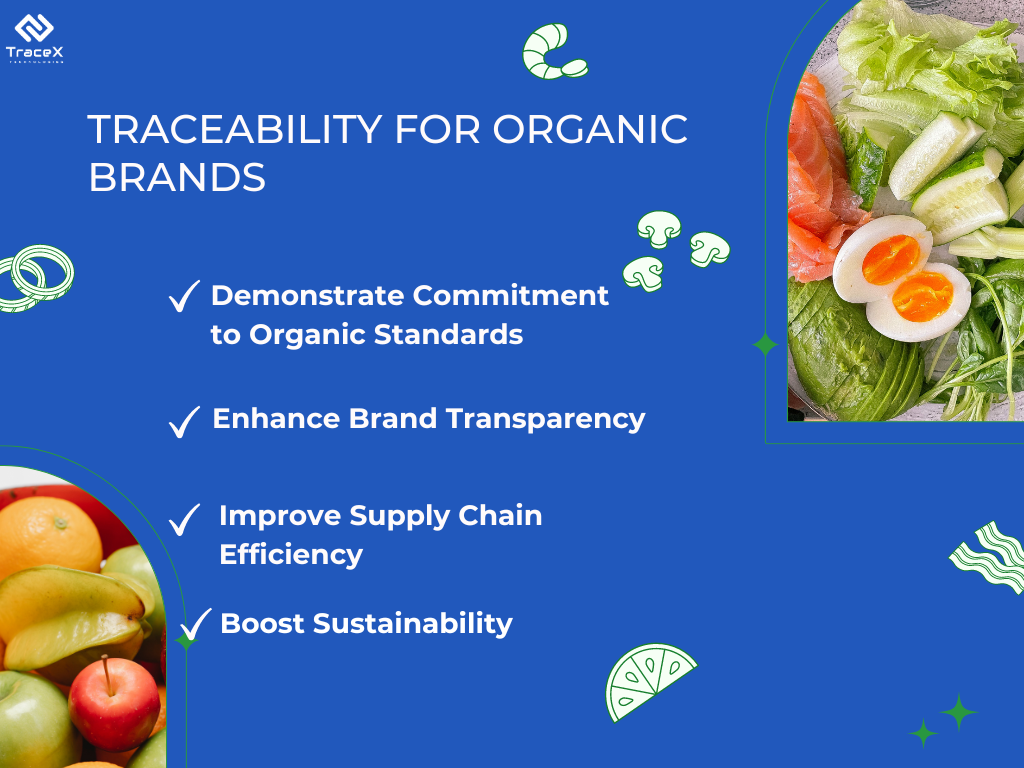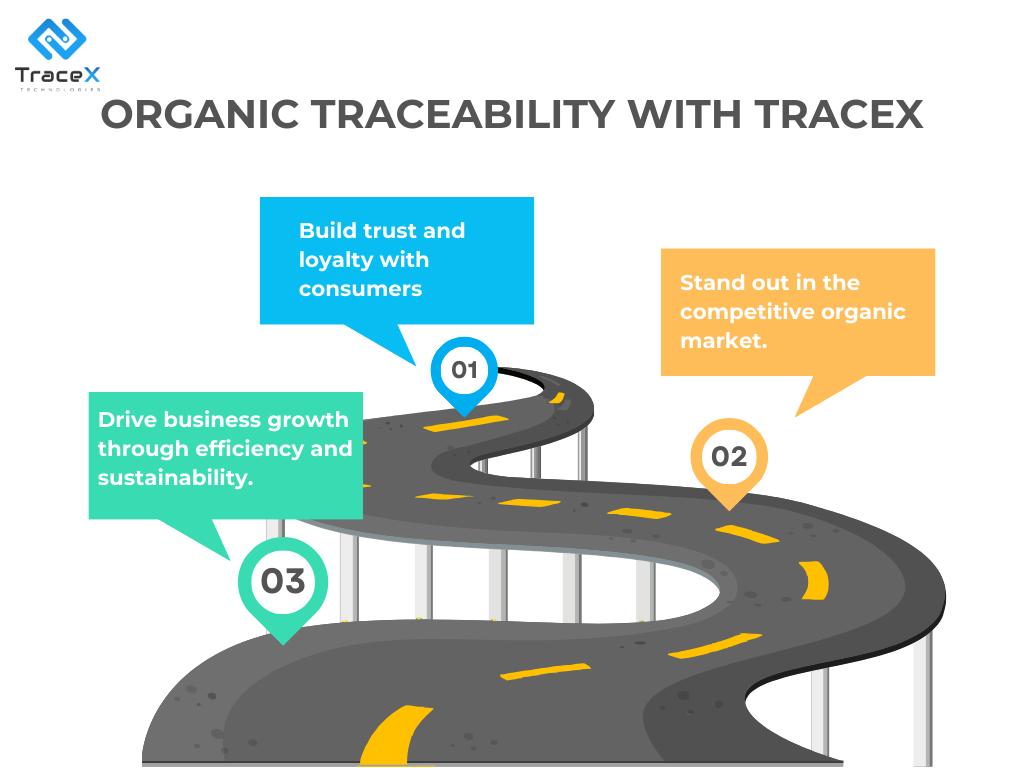Contact: +91 99725 24322 |
Menu
Menu
Quick summary: Explore the importance of organic food traceability in ensuring food safety and compliance. Discover how robust traceability systems enhance transparency, build consumer trust, and meet regulatory requirements in the organic food industry.

Organic food traceability enables brands to track every step of their supply chain—from farm inputs to final packaging, ensuring that organic integrity is maintained throughout. It supports food safety by enabling rapid recalls, enhances sustainability by verifying organic practices, and ensures compliance with global standards like EU Regulation 2018/848 and USDA NOP. By maintaining transparent records and real-time traceability, companies can protect their certification and build consumer trust. According to the Food and Agriculture Organization (FAO), traceability is a critical tool in safeguarding food quality and meeting organic labeling requirements.
In a conscious consumer market, brands today face growing pressure to prove not just that their products are organic, but that they’ve been organic every step of the way. The challenge? Manual recordkeeping, fragmented supplier data, and inconsistent certifications can expose companies to fraud risks, non-compliance fines, and lost consumer confidence. That’s where organic food traceability becomes mission-critical, for safety, sustainability, and regulatory survival.
Key Takeaways
Organic food traceability ensures that every product labeled “organic” can be tracked from farm to shelf, verifying authenticity and compliance with strict standards like EU Regulation 2018/848 and USDA Organic. It’s critical for managing fraud risks, cross-contamination, and audit readiness across fragmented supply chains.
Modern traceability systems use digital farm records, geolocation data, blockchain, and QR codes to capture batch-level events and link them to certification documentation. Brands must map their supply chain, digitize farmer onboarding, and maintain real-time records for planting, harvest, and processing.
Platforms like TraceX automate this process, validating plots, syncing documentation, generating audit-ready dashboards, and ensuring continuous compliance with global organic standards. This approach not only satisfies regulators but also builds consumer trust in the organic label.
Organic food traceability is the ability to track the movement, transformation, and certification status of organic products throughout every stage of the supply chain—from farm input and planting to harvest, processing, and retail. Unlike general traceability, which focuses on tracking origin and product flow, organic traceability adds a layer of validation that confirms compliance with specific organic standards (e.g., EU Regulation 2018/848 or USDA NOP), including prohibited inputs, buffer zones, and certification renewal dates.

In short, organic food traceability isn’t just about ticking certification boxes—it’s about protecting brand trust, consumer health, and long-term market access in a high-stakes global food system.
Want to understand how leading brands are using traceability to boost food safety and transparency?
Dive into our expert blogs on
Food Traceability Best Practices and
Blockchain-Powered Supply Chains to future-proof your compliance and consumer trust.
Traceability in organic food supply chains is essential for protecting product integrity and meeting the rigorous demands of global certifications like EU Organic, USDA NOP, and JAS. It enables companies to monitor each step of the journey—from seed selection and organic inputs to harvest, transport, and processing—while ensuring that nothing unauthorized enters the chain.
In an age where “organic” is often challenged by skeptical consumers and watchdogs, traceability becomes a brand’s most reliable proof—not just a backend tool, but a front-facing promise. Contrary to popular belief, organic supply chains are often more complex due to strict input regulations, seasonal harvests, and fragmented sourcing. That complexity makes traceability indispensable. Instead of preparing data during audits, forward-thinking brands maintain real-time dashboards—making them agile during recalls and proactive with transparency disclosures.
Regulations driving organic traceability include EU Regulation 2018/848, USDA Organic (NOP), IFOAM, and India’s NPOP. These frameworks require complete documentation of farming practices, input use, harvest data, and product movement to prove organic integrity. Certifiers expect detailed traceability records linking each product batch to certified sources. Non-compliance can lead to certification loss, export restrictions, and reputational damage.
These standards collectively define what “organic” truly means—not just in labeling, but in documentable practice across the entire supply chain.
In the event of contamination, traceability provides proof that your organic practices weren’t to blame—protecting your brand from legal and financial fallout. Brands that digitize traceability not only comply—they stand out in crowded organic markets where authenticity sells. Leading exporters now use mobile onboarding apps, QR-tagged produce, and blockchain records to prove origin and compliance instantly during audits.
Modern organic traceability is being revolutionized by digital tools that enable real-time visibility, regulatory compliance, and consumer trust. These technologies help brands move beyond paper records and build transparent, scalable traceability systems.
These include mobile apps and cloud platforms that capture farmer KYC, input usage (e.g., organic-certified fertilizers, pest controls), planting dates, and harvest logs—often in multilingual, offline-ready formats.
Digital records allow smallholders to prove compliance without relying on manual logs or audits. For cooperatives and aggregators, digitized farm-level data makes it easier to standardize traceability across hundreds of small plots.
Blockchain stores immutable records of every transaction or data entry—preventing fraud and manipulation at any point in the supply chain.
Blockchain helps brands defend organic claims during recalls or investigations by offering cryptographic proof of traceability. It turns compliance from a cost center into a brand asset, helping companies offer “digitally verified organic” guarantees to buyers.
Smart labels linked to traceability platforms allow consumers to scan and view the product’s journey—farm location, inputs used, harvest dates, and certifications.
QR code transparency transforms traceability from a back-end audit function into a front-end marketing advantage. In saturated organic markets, traceable storytelling gives brands a tangible edge with ethically conscious consumers.
These technologies not only simplify audit readiness but also future-proof organic brands as regulatory scrutiny and consumer expectations continue to rise.
Building a traceability system that meets organic certification standards requires structured data capture, seamless integration, and audit-ready visibility across your supply chain.
Begin by identifying every actor and process: producers, collectors, processors, packers, exporters, and retailers. Trace each input and product transformation point from source to shelf to ensure full transparency.
Use mobile tools to collect Know Your Farmer (KYF) data, land ownership proof, and organic input usage logs. Link these to specific geolocated plots to verify that only certified land is used for organic production.
Record time-stamped events for planting, harvesting, storage, processing, and transport. Each batch should be uniquely traceable, with clear links between input application, yield, and handling steps.
Sync your traceability data with organic certification documentation—such as conversion timelines, buffer zone maps, and inspection records. Automate reminders for renewals and flag any compliance gaps in real-time.
Use centralized dashboards to monitor compliance status across your supplier network. In the case of unannounced audits, this allows immediate access to proof of organic integrity, eliminating costly delays or risk of decertification.
A well-built system not only ensures certification compliance—it also drives efficiency, reduces manual errors, and strengthens buyer and consumer trust.


TraceX’s digital traceability platform enables producer companies, exporters, and organic brands to meet global organic certification requirements with end-to-end visibility—from farm to fork.
Here’s how it supports each stage of organic compliance:
See Geo-Mapping in Action for Organic Agriculture
Discover how leading agri-exporters are using geo-mapping to ensure certification integrity, trace organic practices, and simplify audit readiness.
Organic food traceability isn’t just a compliance checkbox—it’s a vital tool for brand protection, sustainability storytelling, and long-term market access. With increasing consumer demand for transparency and stricter global organic regulations, brands that invest in robust, digitized traceability systems will be best positioned to lead. From preventing fraud to passing audits with ease, traceability builds the foundation of trust that today’s organic market demands.
Deepen Your Organic Advantage
Explore our expert blogs on
Organic Market Landscape in India.
Stay ahead with insights that help you grow, certify, and scale sustainably.
Organic food traceability is the ability to track certified organic products from farm to consumer, ensuring compliance with regulations and protecting against fraud.
It provides real-time, verifiable records of inputs, harvests, and processing that certifiers require to validate organic integrity and ensure regulatory compliance.
Digital farm records, blockchain, GPS mapping, and QR code labeling are commonly used tools to ensure tamper-proof transparency across the organic supply chain.
